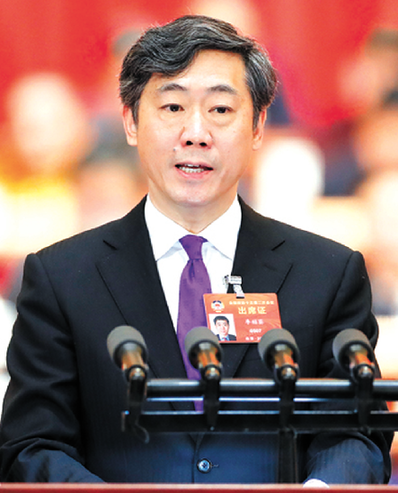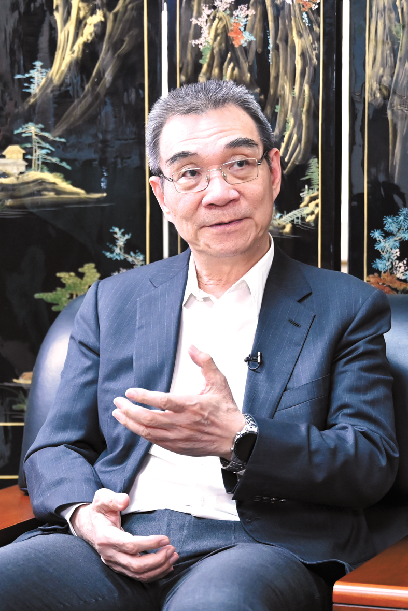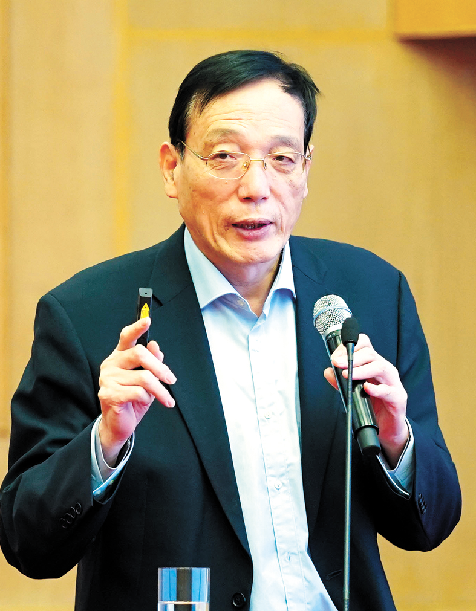The Report on the Work of the Government has proposed that we must adhere to a development philosophy with people’s well-being as its core, and achieve common prosperity through concerted efforts and by concrete steps. Recently, NPC deputies and CPPCC members attending the Two Sessions put forward their own views on the promotion of common prosperity.

Li Daokui

Lin Yifu

Liu Shijin
Photo credit: China News Service
Li Daokui:The income of middle and low income people should grow faster than that of other people
Li Daokui, Member of the Standing Committee of the CPPCC and Dean of the Institute for Chinese Economic Practice and Thinking (ACCEPT), Tsinghua University, said in an interview with the media: there are some people with a misunderstanding that China would soon impose the inheritance tax or increase the real estate tax after the goal of common prosperity was put forward. However, achieving common prosperity is a long-term goal which cannot be accomplished for a couple of years or even for a five-year plan.
Li Daokui points out that currently, and for a long time to come, the most important measure to achieve common prosperity is to allow the low/middle-income people to gain more benefits in the process of economic development.
He says that China needs to ensure that low/middle-income people can find better and more stable jobs through urbanization and the expansion of employment and, at the same time, change their place of residence, for example, from rural to urban areas. In this way, the income level of low/middle-income groups can be raised.
Things in China are different from that of many developed countries. China is still an economy with relatively fast economic growth. Li says that in this context, the best way to achieve common prosperity is to let the incomes of low/middle-income people rise faster than other people in the society. “I believe this is the most important task in the next 5 years, 10 years or even further into the future,” Li says.
China News Service, text by Pang Wuji
Lin Yifu: Prioritizing Comparative Advantages for Economic Development
How can we achieve common prosperity? Lin Yifu, Member of the Standing Committee of the CPPCC and Dean of the Institute of New Structural Economics (INSE), Peking University, pointed out in a recently interview with China News Service that the priority is to develop the economy based on comparative advantages, because this can achieve both efficiency and fairness in the primary distribution of wealth.
Moreover, from the perspective of secondary distribution of wealth, he points out that if enterprises can develop their businesses based on their comparative advantages that give them competitiveness, there is no need for governmental protection or extra subsidies. This means that there will be more resources available for the secondary distribution of income by the government from its fiscal budget. These resources can be used for important undertakings such as mitigating the inequality between urban and rural areas in terms of public services; making a better education system with more investment; taking care of the temporarily unemployed, the old couples who have lost their children, the unmarried and the disabled. These measures can further narrow the income gap down among the Chinese citizens.
Finally, through appropriate taxation incentives, we can encourage some people from the extremely-high-income group to participate in social welfare and philanthropy affairs as the third round for the distribution of income. Lin says that this can not only make the cake bigger, but also solve problems in the process of economic development and make an increasingly fair system for income distribution.
China News Service, text by Pang Wuji
Liu Shijin: the Ultimate Outcome of Robbing the Rich to Feed the Poor is Common poverty
Talking about common prosperity, Liu Shijin, Deputy Director of the CPPCC Economic Affairs Committee, emphasizes in a recent interview with China News Service that there are two keys to achieving common prosperity: first, we must pay attention to the importance of elemental links, especially human capital, while the second is to increase the proportion by the low/middle groups among the total population, particularly by doubling the size of the middle-income group.
How can we achieve this goal? He points out that the most important thing is to help those low-income groups, that is, groups currently below the standard of the middle-income group, to improve their human capital and enhance their capabilities to make a bigger cake. At the same time, it is also imperative to provide equal opportunities and create better condition for them to make a bigger cake.
He also says that to promote common prosperity, the distribution system also needs to be reformed. In addition to the primary distribution and secondary distribution of income, there shall also a third round, namely social charity and public welfare. However, he emphasizes that this round of income distribution must be done in line with voluntary principles. Robbing the rich to feed the poor is definitely the wrong way: first, robbing the rich will dampen the enthusiasm of some people who have become rich through their own efforts in business; meanwhile, feeding the poor is not good for their long-term development, as it’s better to teach one how to fish than directly feeding him with fish. In short, the ultimate outcome of robbing the rich to feed the poor is common poverty.
China News Service, text by Liu Liang
Chen Xiaoping, Member of the National Committee of the CPPCC, Vice Chairman of the Zhejiang Provincial Committee of the CPPCC, and Chairman of the Zhejiang Provincial Committee of the China National Democratic Construction Association (CNDCA)
Giving Full Play to the Role of the Private Sector and Promote Common Prosperity with Concrete Steps
By journalist Zhao Yejiao
Recently, when participating in the joint group meeting of members of the China National Democratic Construction Association and the Federation of Industry and Commerce at the 5th Session of the 13th National Committee of the CPPCC, Chen Xiaoping, member of the National Committee of the CPPCC, Vice Chairman of the Zhejiang Provincial Committee of the CPPCC and Chairman of the Zhejiang Provincial Committee of the China National Democratic Construction Association, has made three suggestions for how to give full play to the role by the private sector in the process of solidly advancing common prosperity.
We need to make further efforts on both the theory and practice of the Two-Unswerving Policy (work unswervingly both to consolidate and develop the public sector and to encourage, support and guide development of the non-public sector), so as to mobilize private enterprises to strive for common prosperity. Chen puts forward a suggestion, saying that it is essential to make it clear that the adherence to the Two-Unswerving Policy will not and must not be changed. Private enterprises are part of the socialist economy while private entrepreneurs are also builders for socialism with Chinese characteristics. We need to see both the positive side and the negative side of capital, then establishing green-light mechanisms. The supervision upon this part shall always be in accordance with laws and regulations, so as to build a healthy, effective and sustainable relation between governmental efforts and private contributions.
We need to first make a bigger cake before discussing how to share it. Chen says that the government should not establish invisible, unfriendly obstacles that impair the development of the private sector. Meanwhile, we should focus on supporting the digital, smart and green transformation of private enterprises. Top-down measures should be made to systematically formulate and implement policies for supporting leading enterprises in each industry; key companies that specialize in emerging and high-end sectors; major hubs in the industrial network; smart factories as well as companies that meet the most up-to-date carbon emission cut standards. Policies should be made in a coordinated manner, but not in a one-size-fits-all way, so as to foster new momentum by the private sector for the development of a modernized economic system.
When it comes to three rounds of the distribution of income, Chen suggests that in the first round, employers and employees shall share stock ownership, so as to build a better share-salary system for private enterprises, particularly by introducing knowledge, technology, management, data and other elements as factors for distribution; in the second round, tax regulation and digital supervision on emerging business models should be strengthened to prevent disorderly expansion of capital and unfair competition; for the third round of distribution, we need to further improve preferential tax policies for charity undertakings, encourage the development of charitable trusts, foster philanthropic organizations and set standards for all kinds of fundraising so as to create a good social environment for the solid promotion of common prosperity.
Zhejiang Transforms Ecological Advantages into Economic Opportunities
By journalists Shi Zinan and Zhang Yudi
As lucid waters and lush mountains are invaluable assets (lucid waters and lush mountains are invaluable assets, or more commonly referred to as the Two Mountains), Zhejiang continues to explore the best way for transforming ecological advantages into economic opportunities, which is an important approach to reach common prosperity in an eco-friendly manner. During the national Two Sessions, NPC deputies and CPPPCC members discussed how to widen such transformation of the Two Mountains.
The Wusi Village in Moganshan Town at the Deqing County of Huzhou City in Zhejiang Province carries out a vivid practice of expanding the transformation of the Two Mountains in Zhejiang to promote common prosperity in an eco-friendly manner.
Sun Guowen, NPC deputy and Secretary of the General Party Branch Committee of Wusi Village in Moganshan Town at the Deqing County of Huzhou in Zhejiang Province, said that on the basis of the construction of beautiful villages, Wusi Village has selected eco-tourism to be a new form of business to enrich its people, integrating Yifeng Flowers and Chenglong Seedling Nursery, Hongfeng Plant and other agricultural production bases into a huge tourist industry chain that covers agricultural, cultural and tourist sectors. The village also tries to keep connected with the Moganshan International Tourism Resort to achieve urban-rural synergy.
At the same time, income by tourism is distributed to the villagers, ensuring that the dividend is shared by all.
Zhang Bing, NPC deputy and Secretary of the CPC Jiaxing Municipal Party Committee, said that it is vital to deeply practice the concept of the Two Mountains, to resolutely hold a bottom line of ecological environmental protection, and to accelerate the resumption of a beautiful Jiaxing with blue sky, green water, prosperous fauna and twinkling stars. Green will be the ultimate theme for an eco-friendly Jiaxing.
Zhang Tianren, NPC deputy and Chairman of Tianneng Group, proposed a crowd-funding mechanism to explore the transformation of the Two Mountains. Specifically, we need to support village-wide public fundraising through both money and land from villagers to build economic programs that can benefit the local community. Moreover, ecological concepts shall be integrated into tourism, healthcare and agriculture to foster new business models that can diversity the sources of income and tap the economic potential for more dividends and benefits.
According to Liu Rui, NPC deputy and Executive Deputy Director of the Institute of Ecological Environment at the Yangtze Delta Region Institute of Tsinghua University, Zhejiang needs to accelerate the promotion of a value accounting mechanism for ecological products as a strong guarantee for green development, so that green products can find their market values.
Liu suggested that an evaluation mechanism of dual accounting, dual operation, and dual promotion of GEP and GDP should be established in Zhejiang, while the development and maintenance of the values in ecological products should be regarded as an important part of the evaluation on the work of government.